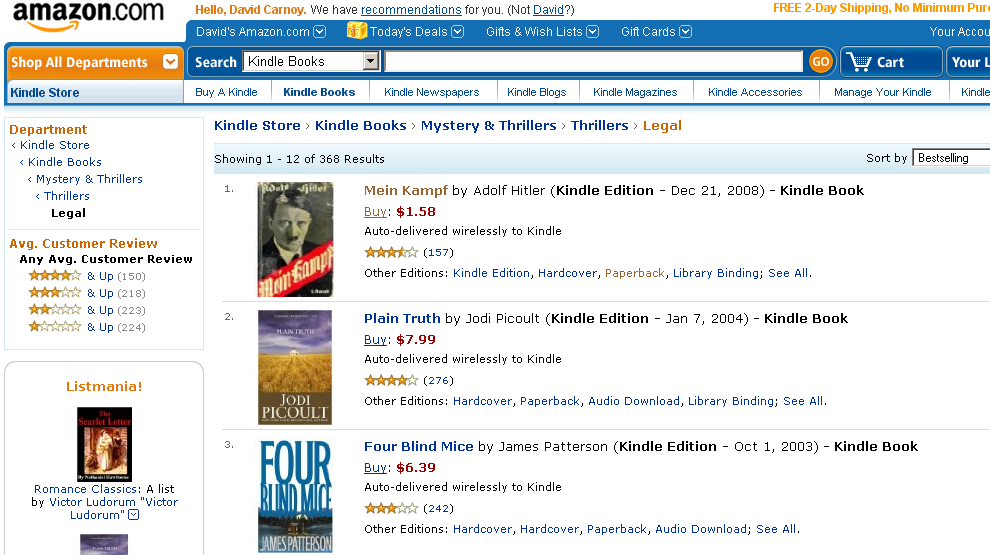 Why You Can Trust CNET
Why You Can Trust CNET Hitler's 'Mein Kampf' a brief Kindle best seller
Yes, having lots of free and cheap e-books in your e-book store sounds good on paper, but it can create some funky looking best-seller lists.

Yes, Sony and Google have teamed up to offer 500,000 free e-books on the Sony Reader. Free is nice, and half a million is an impressive number, but lots of free and cheap e-books can wreak havoc on your database and best-seller lists--just ask Amazon.com, which found itself with Adolf Hitler's "Mein Kampf" briefly sitting atop its best-seller list for legal thrillers in the Kindle Store, experienced earlier Thursday.
The Kindle Edition of "Mein Kampf" isn't free on Amazon. What's interesting is that there are actually two versions: one costs $1.58, and the other costs $1.60.
Both are fairly popular, but it's the cheaper version that captured the No. 1 spot on the legal-thriller list, then bizarrely disappeared within minutes of our capturing the screen grab. (Amazon, which updates its rankings hourly, had yet to respond to a request for a comment when we went to press, but we'll add any response we get when and if it comes).
Amazon also has some issues with competing Kindle best-seller lists. For instance, when you click on the Kindle Books link at the top of the page, you get a list of best-selling titles with stuff like Steve Harvey's "Act Like a Lady, Think Like a Man" and "The Shack" listed at the top (they cost $9.99 and $8.24, respectively). Meanwhile, it appears that Robin Hobb's free "Assassin's Apprentice" is the true No. 1 book in the Kindle Store.
By contrast, in its eBook Store, Sony has been keeping free and supercheap e-books off its best-seller lists, though we noticed a couple of $1 books making an appearance recently. Sony wanted to make sure that its $1.99 classics--it includes 100 of them with your purchase of a Sony Reader--don't dominate the list. That's good, because with 500,000 free e-books on the way, you need to separate the paid books from the free ones, as Apple does on its App Store, or the whole thing gets rather messy.
One other note regarding "Mein Kampf:" Based on a 65-35 split off the list price (Amazon's deal with self-publishers), Amazon is making about 89 cents on each copy, so it's possible that it's making more on "Mein Kampf" than it does on many best-selling titles that it sells for $9.99.
The terms Amazon has negotiated from publisher to publisher are confidential, but sources tell me that at $9.99, Amazon is basically breaking even on a lot of those titles. Sony, by comparison, tends to sell best sellers at $11.99, a price point at which you'd assume that it can eke out a profit.
What does this all add up to? Well, clearly the e-book business is in its Wild West stage, and it's only going to get more convoluted when Sony dumps 500,000 free e-books into its database, and Amazon continues adding more public-domain titles.
All these cheap e-books flooding the market are going to be a problem for traditional publishers (it's unclear who uploaded the Kindle Edition of "Mein Kampf," but it was certainly not a traditional publisher). They'll either embrace the brave new world, and make it work for them with lower, more realistic pricing--or adopt the bunker mentality of the music studios and risk downfall.
What do you think?
Historical footnote: Back in 1999, Barnesandnoble.com stopped selling the Hitler manifesto after the Simon Wiesenthal Center questioned the sales.

